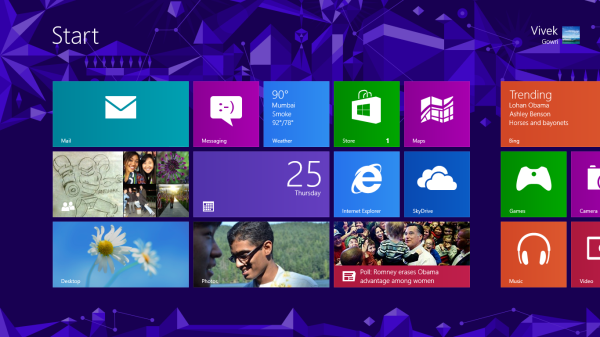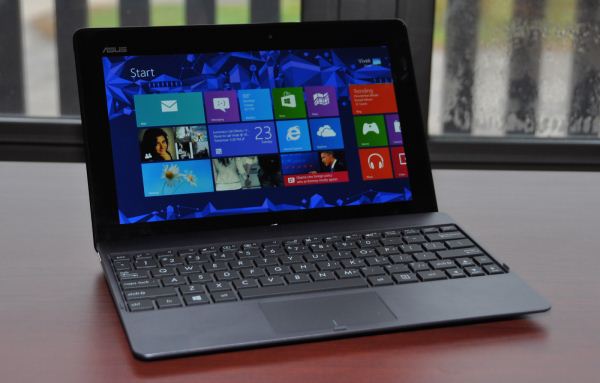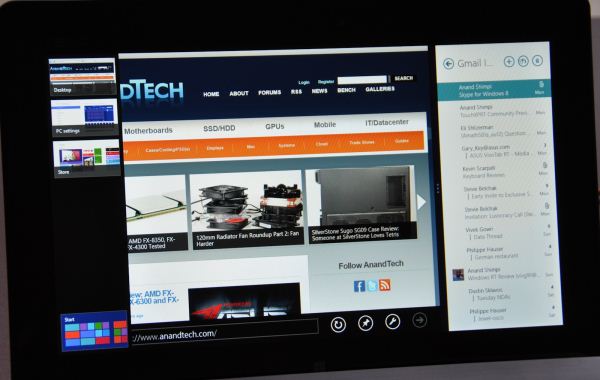The Windows RT Review
by Vivek Gowri & Anand Lal Shimpi on October 25, 2012 12:00 PM EST- Posted in
- Windows RT
- Operating Systems
- Microsoft
- Mobile
- Windows 8
- Tablets
Final Words
So, ten thousand words later, what can we take away from Windows RT? It’s definitely another superb user experience design from Microsoft. Say what you will about Windows Phone 7, but damn if that UI isn’t gorgeous. The Metro design language translates over to the tablet form factor really well, resulting in the Windows Modern UI. We’ve obviously known how Modern UI looks and feels through the various Windows 8 preview builds, but Windows RT ends up being more focused and offering a more consistent experience. It’s a side effect of being limited to apps from the Windows Store - because you spend a significant majority of your time in the new Windows UI, desktop use is minimized. In Windows RT, the Windows Desktop serves the purpose of being the more capable and powerful layer underneath the main portion of the UI, as opposed to Windows 8, which sometimes feels like the new Windows UI existing as an impractical interface layer on top of the traditional desktop.
The dichotomy just feels more comfortable in Windows RT than I feel like it has been in the previous Windows 8 systems that I’ve dealt with. It’s nice. This is the first time I feel like I’ve really connected with the new Windows UI, it makes a ton of sense to me now. I still think for mouse-based navigation, you’re better off treating it as a glorified Start menu, but it’ll be interesting to see how legacy programs affect the use of Modern UI in x86-based Windows 8 tablets as the Windows Store matures.
If you’re really concerned about the state of third-party apps, you just have to wait and see. I’ve seen a lot of snap judgements made about Windows RT in the last couple of days based on the dearth of good applications in Windows Store, and while I agree with that sentiment, I feel like it’s extremely shortsighted to write off the ecosystem already. Neither version of the OS has gone on sale yet, and we know that there are a number of applications that will go live on the official release date, as well as many more coming in the weeks ahead.
This isn’t like Windows Phone, where we need to see whether the platform will get any market traction before predicting the growth of the app marketplace. You can basically assume that the marketplace will expand significantly unless somehow everyone stops buying Windows-based systems on October 26th. The odds of that situation arising seem relatively low, so my bet is that the strength of the ecosystem will be a non-issue a month from now.
The default inclusion of Office 2013 and the emphasis on physical keyboards makes Windows RT the first tablet platform to significantly address the question of productivity. Combined with the equally advanced task switching and multitasking built into the UI, and this becomes the first legitimately useful tablet operating system out there. The Galaxy Note 10.1 wasn’t bad, but it was a single device that built additional functionality into a custom Android skin. Every single Windows RT slate comes out of the box with Office and the ability to have multiple active application windows. It’s just a few steps ahead of competing tablet platforms at this point.
And it’s not like RT loses out on a content consumption front. It’s paired with what is a very strong entertainment store and gaming franchise in Xbox Live, and the browsing experience is definitely competitive. It’s also a competent e-reader, with Amazon’s Kindle being one of the headlining apps currently in Windows Store. It even matches the power efficiency of the other ARM-based tablets, with competitive battery life and standby time. Obviously, ARM is the driving factor in the low power consumption, but it’s good to see that Windows is on a similar level as iOS and Android.
So this is a tablet platform that can do a good job of replacing both an iPad and an ultraportable in a number of different workflows. You get the best of both worlds, in some sense - Windows RT tablets have similar form factors to the iPad and leading Android tablets, and offer near-equal battery life, performance, and user experience, but they also give you the added benefit of strong productivity applications and the power of Windows Desktop. From a conceptual standpoint, almost anything you can do with an iPad can be done equally well (or close) on a Windows RT tablet, but the desktop-caliber office suite and versatile multitasking interface of Windows RT are impossible experiences to replicate on the iPad. It's not a perfect operating system by any means, but it brings a new dimension to the tablet space. So if you’re looking for a new tablet this fall, Windows RT deserves your consideration.













233 Comments
View All Comments
aepxc - Thursday, October 25, 2012 - link
..."Tablets (despite being low power) are cannibalizing the PC market. Why is this?"...IMHO, because number of activities that can be done with a computer >> number of activities that can be done on a computer. I really think the consumption vs. creation framing is a misunderstanding – the thing actually being measured is how much of the creation is done on the computer (e.g. read an interesting article, form a new insight into a problem you have been trying to solve), and that is not, I believe, of significant importance.
But thanks for your response – it's an interesting perspective, well-argued.
ludikraut - Friday, October 26, 2012 - link
..."Tablets (despite being low power) are cannibalizing the PC market. Why is this?"...I'm not sure that tablets are cannibalizing PC sales. I think instead PC sales have remained stale as for several years now the hardware has been powerful enough for the average user to do just about anything they need on their computer. This means that instead of buying a new PC every two to three years, you've now got that money available to purchase something in addition to your existing and perfectly capable PC. More times than not that extra purchase will take the form of a tablet or e-reader these days, IMO. So in essence I think overpowered PCs are helping to drive tablet sales. :)
l8r)
twtech - Saturday, October 27, 2012 - link
I would tend to agree with that. I think they will have some impact on PC sales in the cases where the PC would have been bought solely for somebody to browse Facebook with.I have no interest in giving up my PC though, even as I type this post out on a Nexus 7. I use this thing mostly for web browsing and watching Netflix when I don't want to have to sit at a desk. My desktop PC does everything else.
steven75 - Friday, November 2, 2012 - link
The iPad has had a first party office suite since the first iPad was announced in 2010, along with third party word processors too numerous to count.What exactly is stopping you from taking notes in class on an iPad? Can't find a BT hardware keyboard out of the hundreds available?
I don't get this argument. At. All.
daboochmeister - Thursday, October 25, 2012 - link
You didn't point out that there are real limitations with the Office included in the Surface RT ... no macros/plug-ins, and you can't use it for any work-related tasks unless there's a separate license for Office 13 in place.http://office.microsoft.com/en-gb/home-and-student...
Notice that last comment - many reviewers are glossing over this - you need a license for Office 13, not a previous version, to use it for work tasks. If your company hasn't upgraded, you can't (legally) use it for anything for-profit.
Spivonious - Thursday, October 25, 2012 - link
Just like every version of Office Home and Student from 2007 on. This is not specific to Office 2013 on Windows RT.daboochmeister - Thursday, October 25, 2012 - link
But it has particular relevance here, because of the way the Surface RT has been viewed (and reviewed) as a business tablet ... but there's been little discussion of these limitations.For example, I haven't seen a single review point out that if your company has only licensed Office 2010, you don't have the necessary license to permit (legal) use. Do you, Spivonious? Has your company upgraded? Mine hasn't ... and our customer sites still use 2003, many of them.
And ... a key difference is that most business licenses permitted installation of the full suite on people's PCs at home -- eliminating the concern about macros/plug-ins/forms/3rd party apps. That's simply not possible here.
ssiu - Thursday, October 25, 2012 - link
Yeah the bundled Office RT gives no extra value for companies. That is because it is a "Home and Student" version. But that is no different than the "traditional x86 Office Home and Student" license -- you cannot use that for work either (even non-profit organizations), even if you buy it.(Whether people follow or ignore the license restriction is a separate issue ...)
daboochmeister - Thursday, October 25, 2012 - link
See my reply above for why there is a big difference in this case ... most business licenses permitted an employee to install a copy on a home PC, for business use. That simply won't be possible here.karasaj - Thursday, October 25, 2012 - link
Most businesses will probably go for Windows 8 or Windows 8 Pro (See Surface Pro). RT really honestly has simply been marketed for exactly that - home and student use.